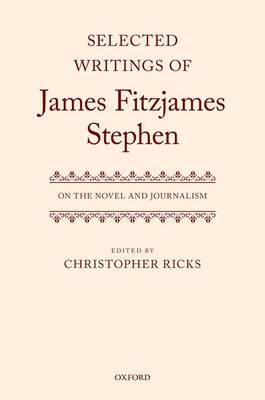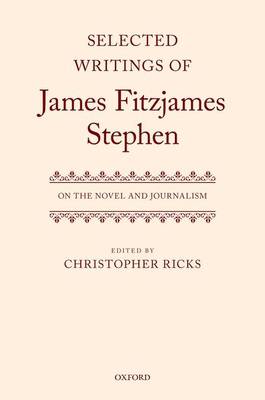
- Afhalen na 1 uur in een winkel met voorraad
- Gratis thuislevering in België vanaf € 30
- Ruim aanbod met 7 miljoen producten
- Afhalen na 1 uur in een winkel met voorraad
- Gratis thuislevering in België vanaf € 30
- Ruim aanbod met 7 miljoen producten
Zoeken
Selected Writings of James Fitzjames Stephen
On the Novel and Journalism
€ 338,45
+ 676 punten
Omschrijving
James Fitzjames Stephen (1829-1894) is still highly valued as a judge, as the historian of the criminal law of England, and as the author of Liberty, Equality, Fraternity, a forthright disagreement with John Stuart Mill. Stephen's weekly journalism established him as a vigorous cross-examiner in the controversies--cultural, social, religious, political, moral, and philosophical--of his time (and duly, of our time). Collected here now are his essays on the novel and journalism, the co-operation and collusion of these two, their responsibilities and irresponsibilities. Written between 1855 and 1867, while Stephen prosecuted twin careers as barrister and journalist, these reviews bring to bear his formidable powers of mind and of phrasing, scrutinizing many deep and disconcerting novelists--Dickens and Thackeray, Harriet Beecher Stowe and E. C. Gaskell, Flaubert and Balzac. His work also weighs journalism in the scales: from Addison's The Spectator to the Crimean war correspondence of William Howard Russell; from the scabrously detailed law-reports in The Times to the phenomenon of Letters to its Editor; from the high culture of Matthew Arnold to the mass market of 'Railroad Bookselling'.
Specificaties
Betrokkenen
- Uitgeverij:
Inhoud
- Aantal bladzijden:
- 304
- Taal:
- Engels
- Reeks:
Eigenschappen
- Productcode (EAN):
- 9780192882837
- Verschijningsdatum:
- 18/08/2023
- Uitvoering:
- Hardcover
- Formaat:
- Genaaid
- Afmetingen:
- 160 mm x 224 mm
- Gewicht:
- 612 g

Alleen bij Standaard Boekhandel
+ 676 punten op je klantenkaart van Standaard Boekhandel
Beoordelingen
We publiceren alleen reviews die voldoen aan de voorwaarden voor reviews. Bekijk onze voorwaarden voor reviews.










